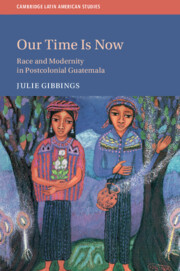'It is hard to write a modern Guatemalan history that is a not just a grim march to the genocide of the 1980s, but this exciting, meticulous book does it spellbindingly. Refusing to universalize colonizing linear time, Gibbings pries open the archive to engage the pluriverse of transforming Mayan experience with salutary attention to gender. While rooted lovingly in place, this is a profound analysis of plantationocene worlding that will resonate for anyone concerned with today’s global crisis of racialized climate collapse.'
Diane Nelson - author of Who Counts? The Mathematics of Death and Life After Genocide
'Through nuanced analysis of archival materials and oral histories, Gibbings reveals indigenous peoples’ perspectives, strategies, and responses to local and national politics. In so doing, she captures the complexity of class, gender, ethnic, and power relationships amongst Q’eqchi Mayas and between them and Hispanic authorities.'
David Carey - author of I Ask for Justice: Maya Women, Dictators, and Crime in Guatemala, 1898-1944
'Gibbings deftly renders the radical imaginaries of indigenous Guatemalans, for whom the legacies of empire, liberalism, forced labor, and political violence weighed like a nightmare. This theoretically sophisticated and archivally-grounded book not only recasts the history of post-colonial Guatemala but also, like the very Q’eqchi Maya alternative modernities at the heart of its story, unsettles the normative temporalities and teleologies of Western racial capitalism.'
Kirsten Weld - author of Paper Cadavers: The Archives of Dictatorship in Guatemala
‘Packed with insights, this work is essential reading for all Guatemalanists and specialists interested in Native intermediaries, rural land and labor systems, and subaltern histories of the transition to capitalism.’
J. T. Way
Source: Hispanic American Historical Review
‘Our Time Is Now is an extensive, carefully researched and elegantly argued book that presents its readers with multiple, intertwined histories: of the development of coffee production and the nation-state in Guatemala’s majority Indigenous Alta Verapaz region; of the concurrent emergence of key ideas about race, progress and ‘modernity’ in Guatemala as a whole; and also, more reflexively and, as its title suggests, about the often-contentious ways in which history is created, and how such processes may be tied to contested definitions of time itself.’
Nathaniel Morris
Source: Journal of Latin American Studies
‘Theoretically profound, painstakingly researched, thoughtfully argued and beautifully written, Julie Gibbings’ Our Time Is Now is a brilliant addition not only to Guatemalan and Latin American history but to colonial and postcolonial studies in general.’
Michael D. Kirkpatrick
Source: Canadian Journal of Latin American and Caribbean Studies
‘… a fascinating history … meticulously researched … this book has much to offer both historians of Guatemala and people interested in historical methodologies.’
Catherine A. Nolan-Ferrell



